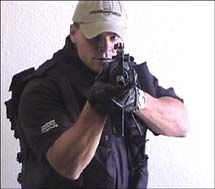 |
By: Trainer Jose L. Medina
We face extremely trying times in our society. LEOs must obtain current, case law sensitive and thorough training from their agencies in order to stay ahead of the ever-evolving criminals in their communities. Many officers pay their own way for high quality training due to the lack of department-initiated advanced training.
The training in the agency itself can sometimes be deemed more of what I like to call “procedure” type training as opposed to “passionate” type training. But training within your agency should be treated as high-end training without the bulky price tag. Any form of advanced training is just another tool for your agency’s tactical tool box.
The current training in police departments covering areas such as firearms, self defense and force-on-force training is normally done with the minimum amount of time allotted for that type of training. The concern here is that instructors and trainers of these agencies do not realize the potential liability they may face when conducting in-service training in a “by the numbers” environment.
As a trainer myself, I have dedicated my life to training officers with a strong passion and with their safety as my main priority. With my agency, we have had great opportunities to give more training time to our personnel and even with limited time constraints, we make the most out of our training time.
Zuchel v. City of Denver talks about the “failure to train” principle, negligent type training and how the city needed to improve their training. This is a critical component that instructors must understand: Limiting the training to a “procedure” mode will result in liability (injuries or death) to an officer who paid the price for lackluster in-service training operations.
The point here is that we as instructors must take the limited amount of time and resources we are given and conduct “high-end” training. We need to create a whole new training atmosphere for our officers so that they leave the training thanking you for giving them more tools for their operational toolbox.
If you feel that going through the “numbers” in our training for our personnel is acceptable, be prepared to write an official report to explain why you allowed your personnel to leave an hour or two early from training because they had something better to do, and the end result was severe injury or death.
Others may come back to bite you and say, “I was not given the full training. He/she didn’t keep us there for the whole program, and I felt like I was cheated out of my training.” Think that’s not possible? Remember this is 2006 and anything is possible.
Nothing is better than receiving free high-end training courtesy of your agency. It is your job to find ways to spread the critical knowledge that will help your personnel make it to work the next day. Going after other advanced training programs is only going to make you that much better in the field. But remember, it starts at your own agency first. As a trainer of law enforcement officers, you owe it to your personnel to give the best training possible no matter what the time frame is.
Jose L. Medina is the President/Director of Training Operations for Awareness Protective Consultants LLC Tactical Combat Fighting Systems

